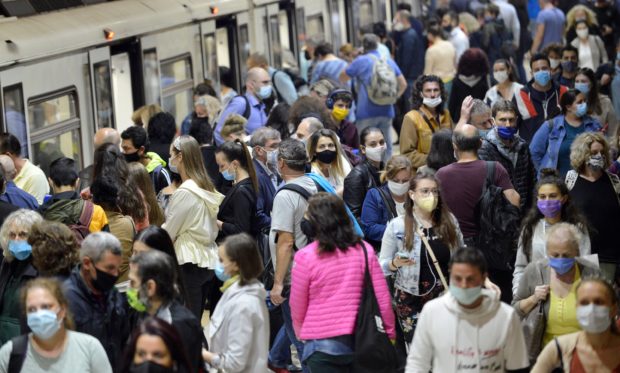Socializing in public stressing you out? Here’s why many are having re-entry anxiety

Image: Circlephoto/Shutterstock via ETX Daily Up
The reopening of restaurants, cinemas and cultural places is delighting many people who have been craving variety in their perspectives and who have been in need of reconnecting with other people. But for some people, this return to a normal life has amplified anxiety that has been present since the first round of lockdowns or even before. Feelings of re-entry anxiety or even agoraphobia may take some time to dissipate.
Many regions have been recently returning to nearly normal life, with ends to restrictions on dining spaces, number of people one can socialize with, and even in some places where vaccination numbers are high, alleviated mask guidelines. It’s good news for some, but this abrupt shift in lifestyle can be worrying for others.
Agoraphobia is essentially the fear of public spaces and crowds, and some form of it, or a kind of re-entry anxiety, is manifesting as a symptom in many individuals contemplating the return to in-person social interactions. How do we deal with crowds of people in restaurants? And in the metro? At the workplace? These are all questions that individuals may be asking themselves. A poll conducted by the American Psychological Association in February found that nearly half of adults polled “felt uneasy about adjusting to in-person interaction once the pandemic ends.”
Like agoraphobia, which is an anxiety disorder usually caused by a psychologically traumatic event, with re-entry anxiety, there’s no need to look any further than the pandemic itself to find a traumatic event. In a 2020 study, Danny Horesh, associate professor in the Department of Psychology at Bar-Ilan University, and Adam D. Brown, assistant professor in the Department of Psychology at New York University, consider the health crisis a traumatic event. Psychotherapist Pierre Nantas also explained in May 2020 that “the situation… has a lot in common with a state of post-traumatic stress.”
‘Time to thaw’
Whether we talk about “Covid hermits” or “the re-entry anxious,” many individuals have no desire to be out and about dealing with face-to-face networking, making small talk and navigating crowds; they want to stay at home, well away from the outside world and its labyrinth of social interaction. With the pandemic, many people report that they prefer to stay at home, taking up new activities, such as cooking, painting, reading or just watching a show.
The crisis has served to amplify media coverage of agoraphobia and anxiety about socializing. And fortunately, professionals have long worked with those suffering from them and so have strategies about how to deal.
The shift from “all closed” to “all open” has been abrupt. In a Business Insider article about the fear of social un-distancing, journalist Aria Bendix explains that the health crisis is a trauma that has “frozen us” and that it will take time to readjust.
“It will still take quite some time, I now realize, for me to thaw,” she writes. Among the strategies recommended by SCL Health are “exposure therapy,” or starting small, buddying up and looking at the big picture. And of course seeking help if necessary. JB
RELATED STORIES:
Being around kids could make adults more compassionate, says study
Intelligence not a matter of IQ but rather a mental state, says neuroscientist